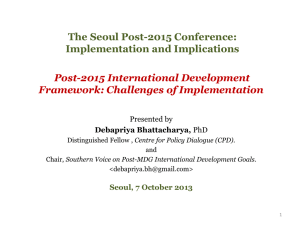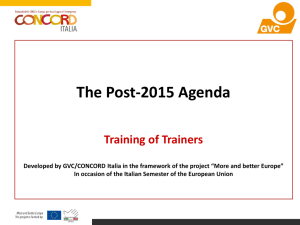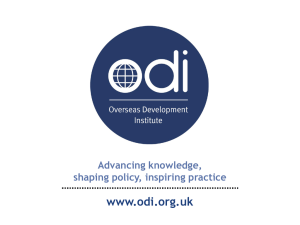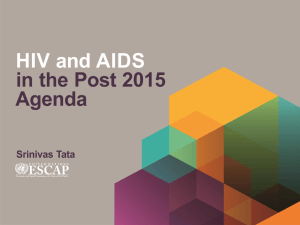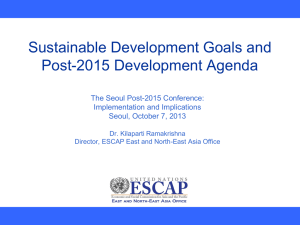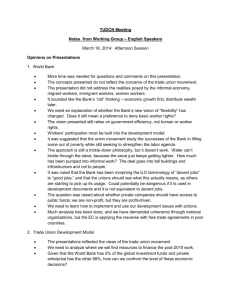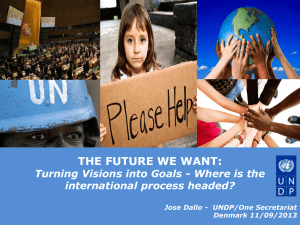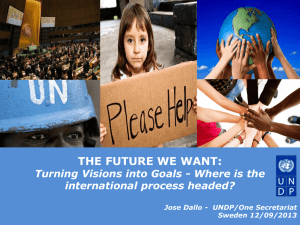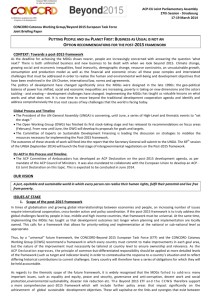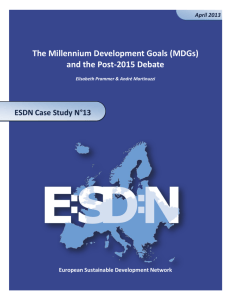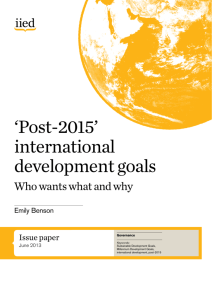Statement of the Hon. Minister on 16 May 2013, Vaghjee Hall, Port
advertisement
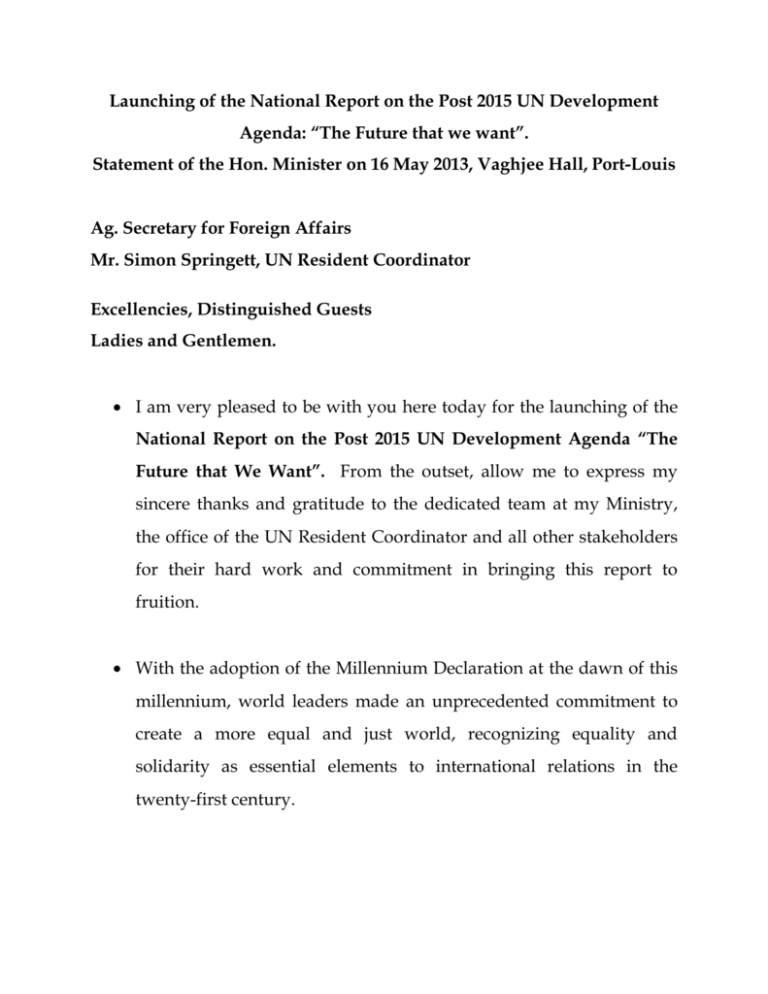
Launching of the National Report on the Post 2015 UN Development Agenda: “The Future that we want”. Statement of the Hon. Minister on 16 May 2013, Vaghjee Hall, Port-Louis Ag. Secretary for Foreign Affairs Mr. Simon Springett, UN Resident Coordinator Excellencies, Distinguished Guests Ladies and Gentlemen. I am very pleased to be with you here today for the launching of the National Report on the Post 2015 UN Development Agenda “The Future that We Want”. From the outset, allow me to express my sincere thanks and gratitude to the dedicated team at my Ministry, the office of the UN Resident Coordinator and all other stakeholders for their hard work and commitment in bringing this report to fruition. With the adoption of the Millennium Declaration at the dawn of this millennium, world leaders made an unprecedented commitment to create a more equal and just world, recognizing equality and solidarity as essential elements to international relations in the twenty-first century. The Millennium Development Goals (MDGs), which emerged as practical and measurable objectives of the Millennium Declaration, have enjoyed sustained interest and support from governments, the global development community, civil society and other stakeholders. Enormous progress has been made towards achieving the MDGs in many areas - on aggregate terms, the goal on access to safe drinking water has been met five years ahead of schedule. The target of cutting extreme income poverty in half by 2015 was met ahead of time in 2010. Moreover, more children than ever are attending primary school, the number of child deaths have dropped dramatically and targeted investments in fighting malaria, AIDS and tuberculosis have saved the lives of millions. Ladies and Gentlemen The MDGs framework, set to expire at the end of 2015, has indeed demonstrated the power of global goals and a shared purpose, bringing nations and people together. A milestone in global and national development efforts, the MDGs are still making a real difference in people’s lives. However, while these gains must be consolidated, many challenges still remain to be addressed as the 2015 deadline approaches. Progress on achieving the goals has been uneven within and across countries. Some countries and regions still require intensified efforts to reduce hunger, child and maternal mortality rates, to improve access to drinking water and sanitation amongst others. The need therefore, is for a clear Post 2015 Development Agenda through which, efforts to achieve a world of prosperity, equity, freedom, dignity and peace will continue unabated. The initiative of UN Secretary-General Ban Ki-moon for the establishment of a UN System Task Team to coordinate preparations together with governments, civil society and other partners, so as to build on the momentum generated by the MDGs and carry on with the ambitious Post-2015 Development Agenda, is indeed commendable. Ladies and Gentlemen. It is indeed a matter of pride that as the new Post-2015 framework is being developed, Mauritius was one of the sixty-two countries in the world to have been selected to hold national consultations. The Government together with development partners, the UNDP, Civil Society Organizations, private sector, the youth, the elderly and other stakeholders, engaged in an inclusive consultative process, that provided a platform for the fostering of deeper interactions on how the international community should view a Post 2015 Agenda. Through this process, stakeholders had a golden opportunity to take stock on our MDG achievements, shortcomings and reflect on new challenges as well as identify new goals. The outcome is the National Report on the Post 2015 UN Development Agenda that we are about to launch today; - A report that mirrors the aspirations of the Mauritian society at large. I shall now dwell on some of the key recommendations of the National Report which will be fed into the report of the UN HighLevel Panel constituted by the UN Secretary General for the Post 2015 Roadmap. Ladies and Gentlemen Our recommendations revolved around three main axes: (i) Firstly, the need to restructure the current MDGS; (ii) Secondly, the adoption of new goals for a Post-2015 UN Development Agenda; and (iii) Thirdly, the coherence of the process with other existing initiatives Mauritius strongly believes that poverty eradication should remain a central objective of a Post-2015 UN Development Framework. We believe this should however be re-formulated to include the notion of food security namely access to affordable, safe and nutritious food. Moreover, the goal oriented structure as found in the current Millennium Development Goals (MDGs) should be maintained. These goals can however be re-structured. For example, Goal 2 on Achieving Universal Primary Education, could be reframed to “Achieving universal Pre-Primary, Primary and Secondary Education of quality” while MDGs 4, 5 and 6 could be clustered into one goal entitled ‘Universal Health Coverage’ which would provide a multisectoral approach to reduce the health inequities. It is felt that a Post-2015 UN Development Framework should build upon and improve the current MDGs, through greater emphasis on issues such as education, human rights, economic growth, decent work, job creation, inequality, climate change and changing population dynamics. We also believe that SIDS like Mauritius should be given sufficient and special attention, particularly towards bolstering our resilience, risk mitigation and adaptation measures. On the issue of new goals for the Post-2015 UN Development Agenda, the Consultation processes also identified new goals, namely: (i) Achieving Sustainable Economic Growth; (ii) Building Resilience for Vulnerable Countries (SIDS, LDCs, African countries); (iii) Addressing issues related to population dynamics, especially the ageing population; (iv) Consolidating Good Governance; and (v) Consolidating Universal Human Rights In addition to the above, we believe that there is need to ensure better coherence between the Post-2015 UN Development Agenda and other UN processes. In this context, the outcome of the Post-2015 UN Development Agenda needs convergence with the Rio +20 process and the proposed Sustainable Development Goals (SDGs). Moreover, there is a need to integrate, within the new Post-2015 UN Development Framework, the issues identified in the Mauritius Strategy for the further implementation of the Barbados Programme of Action. Provision should also be made for integration of the outcomes of the forthcoming SIDS meeting in 2014, in the Post-2015 UN Development Framework. As each UN process and convention has its own reporting system, it is important to simplify such processes and maintain a system-wide coherence in the Post-2015 UN Development Framework. In a nutshell therefore, the Post-2015 UN Development Framework will only be successful if it emerges as a nationally driven, open, participatory, transparent, inclusive, and bottom-up process which continues to strengthen partnerships and engagements between Governments’, Private Sector, Civil Society Organisations, women, the disabled, the elderly, vulnerable groups and in particular, the youth; so that their voices can be heard and they become “agents of change” on all fronts. It is equally important to develop the right synergies between regional organisations, such as the African Union, and sub-regional organisations: SADC, COMESA, EAC, IOR-ARC, and IOC, to be actively involved in the Process. The integration of issues identified in the NEPAD Process, in particular, the African Peer Review Mechanism with the Goals that would constitute the Post-2015 UN Development Framework is also of essence. Ladies and Gentlemen I commend once again all those involved in producing this National Report for the new Post-2015 UN Development Framework; a Framework which we hope will further contribute to equitable human development and to an improved “Future that we want”. Thank You

